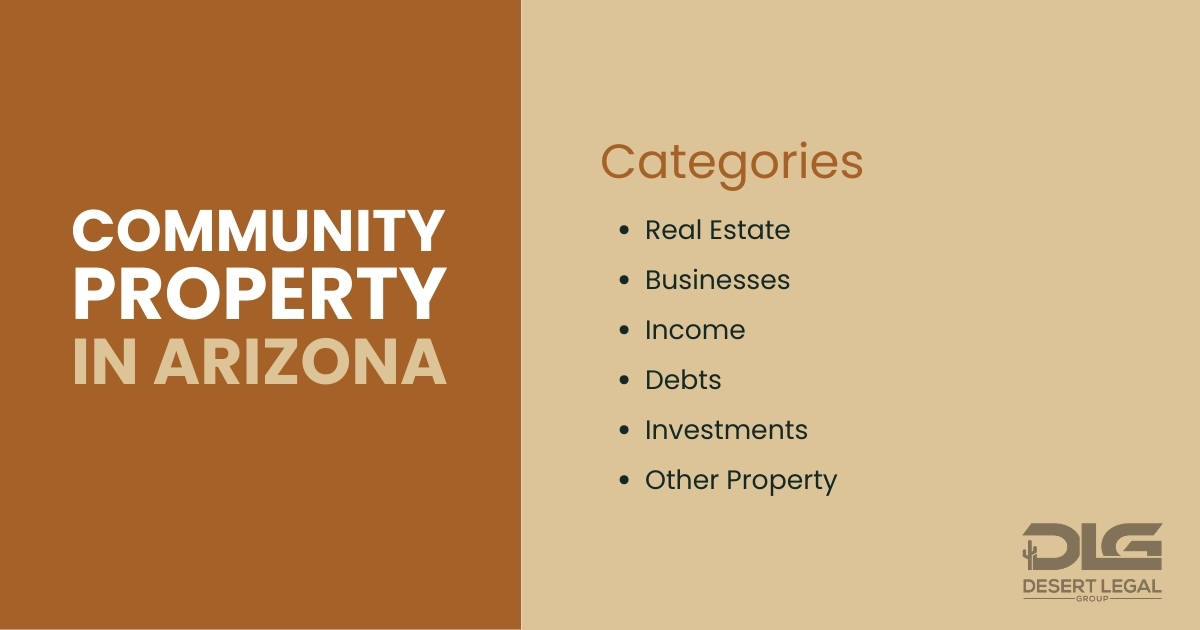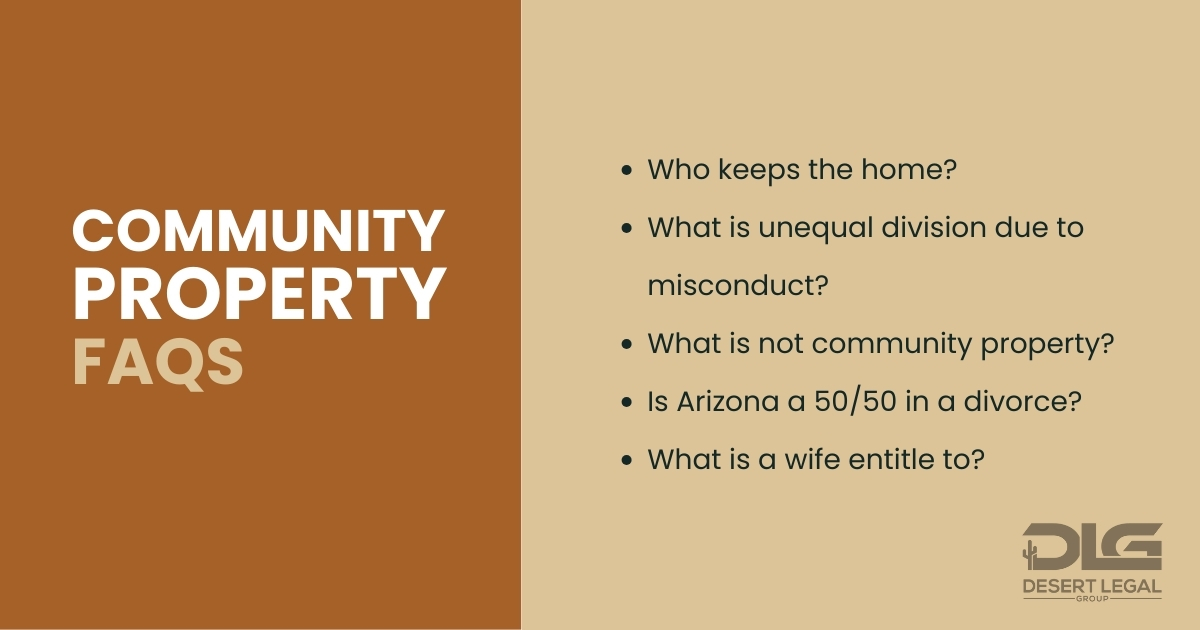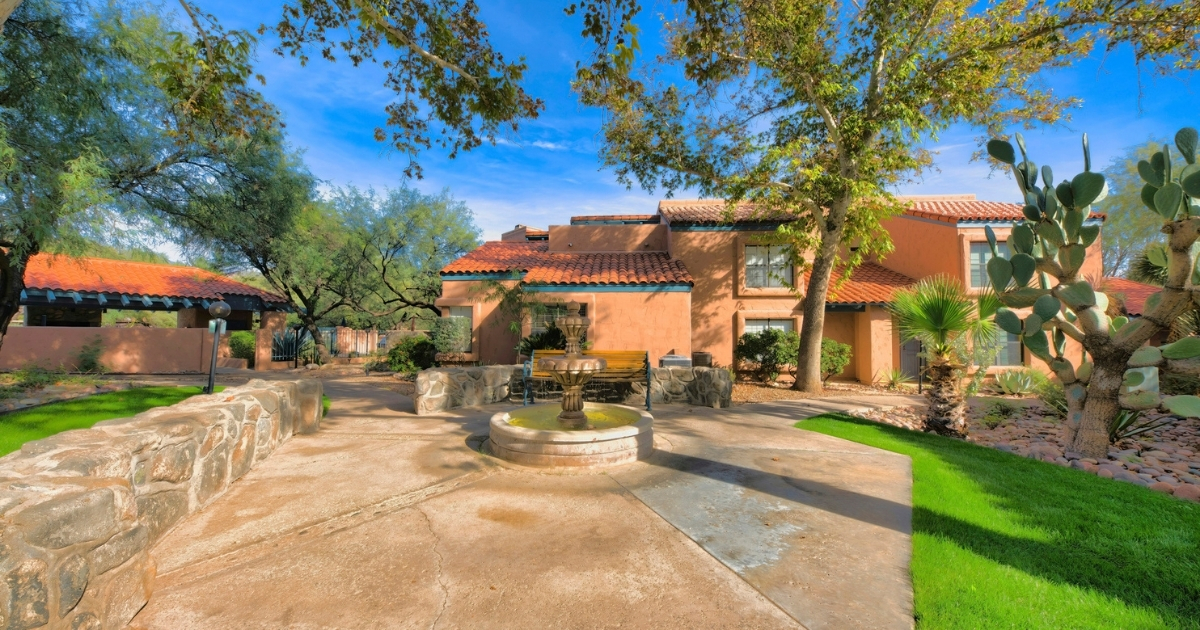Divorces can be emotionally challenging and draining, and navigating unfamiliar legal matters adds an extra layer of complexity. At Desert Legal Group, we understand that the challenges of divorce can be an additional strain during already trying times, especially when disputes arise. Our skilled family law attorneys can empower you with the knowledge you need to understand community property division in Arizona and how it can impact your approach to divorce proceedings.
Arizona operates under community property law, meaning most assets accumulated during a marriage are jointly owned. While its purpose is to enable the equitable distribution of assets during divorce, joint ownership can cause complications when dividing property like homes, cars, investments, and debts. This guide will help you traverse the complexities of community property in AZ, handle common disputes that arise, and learn better ways to approach the property division process.
Facts About Community Property
Nine U.S. states have community property laws: Arizona, California, Idaho, Louisiana, Nevada, New Mexico, Texas, Washington, and Wisconsin. Arizona’s community property laws state that property acquired during a marriage is owned equally, with very few exceptions for property acquired as a personal gift or inheritance. In the event of divorce, the spouses divide community property equitably; this often does not result in a precise 50/50 split but grants approximately half of everything owned to each party.
Before we dive into the various types of community property, it is important to explore how property can become community property.
Separate Property
As mentioned, not everything owned by a married couple is community property. Premarital property owned by a spouse stays separate unless it is accidentally or intentionally changed to community property.
Examples of situations where a spouse may accidentally convert separate property to marital property are:
- Moving personal funds acquired before marriage into a joint bank account
- Gifting one spouse’s personal property to another spouse
Sole and Separate Debts
Debts incurred before marriage, and sometimes after a spouse serves the Petition for Dissolution of Marriage, are separate debts. Separate debts follow the spouse who incurred them. A spouse’s debt incurred for the maintenance or repair of a community asset may be considered a community debt after serving the Petition for Dissolution of Marriage.
Often, in divorce cases, a party that had a separate debt used community funds to pay a percentage of this debt. The court can order the reimbursement of the community payment.
Community Lien
A community lien materializes when separate property is invested in or improved with community funds or labor. Community liens typically apply to real estate or business situations.
For example, a community lien may arise if a spouse owned a business before marriage, but the company increases in value during the marriage. The community might claim a portion of the increase in value of said business.
Another common example is if one spouse owns a home or vehicle before marriage but uses joint bank account funds to repair or improve that asset. They have created a community lien. The community has a claim to a portion of the equity in the asset.
Community liens may have to be appraised in a divorce to settle what one partner receives.
Categories of Community Property in Arizona

Understanding Arizona’s community property categories and how they are divided can help you approach the divorce process with clarity. A skilled attorney can help identify community and separate property to support a fair division of assets.
Real Estate
Homes or real estate purchased for marital purposes after a couple’s marriage date in Arizona are community property. Arizona law states that community property should be split evenly between parties in divorce.
Questions like “Who gets the house?” can cause headaches in divorce proceedings because the answer is rarely straightforward.
The following situations may arise, affecting the division of the home asset:
- One party shows more interest – This scenario typically results in the interested party receiving the home, and they must either buy the uninterested party’s share or give up equal-value assets. In both solutions, the retaining party removes the departing party from any deeds, mortgages, or other obligations or rights to the property.
- Both parties show interest – This scenario often becomes contentious and may need to be presented to a judge. Often, the judge will grant the home to one party, potentially costing them other assets they meant to retain to buy out the other party.
- Neither party shows interest – In this case, the parties sell the home and split the proceeds evenly.
Businesses
A business that provides income for divorcing parties is community property. Typically, before making any decisions about a company’s fate, an outside party completes a valuation.
Closely-held businesses, including professional practices and retail businesses, can each have their complications when sought after in a divorce.
Solutions for these complications may involve:
- Co-ownership – If neither party wants to remove themselves, co-ownership is possible. This solution is most substantial in cases of amicable spouses who have a solid working relationship and trust. Parties should seek alternatives if they have animosity toward one another.
- Buy-out – This is a good option when there are sufficient assets to complete this transaction. One party keeps the business while paying the other party for their portion. Suppose the buying party needs the cash or liquid assets to carry this out. In that case, they might offset the transaction with home equity, investment funds, securities outside qualified plans, or a property settlement note.
- Selling – If neither spouse desires to keep the business or the situation becomes too complex to manage, selling the business and dividing the proceeds is possible.
Income
In Arizona, any income earned after marriage is community income. Community income can include wages, commissions, bonuses, tips, and income from self-employment or rental properties acquired during marriage. It is important to note that income from separate property can be considered community property.
Debts
Unlike some states, most debt acquired during marriage in Arizona is community debt, meaning that both spouses take on debt acquired by either separate spouse. This rule applies even if one spouse has no involvement in the application process and receives no benefit from the loan. For example, if one spouse purchased a car on loan, it would be considered marital property, even if the other spouse chooses not to drive it or put any individual funds towards it.
While separate property is protected from debt collectors or creditors, community property is not. After legal separation or divorce, the spouse who incurred the debt owes it unless it was incurred for marital necessities, maintaining jointly owned assets, or if the spouses choose to retain a joint account.
Investments
Financial investments are community property. Investments can be separate property when accumulated through a gift, bequest, inheritance, or profits from separate property.
If a spouse wants a premarital financial investment to remain personal property, they should keep it traceable, well-recorded, and distinguishable from any marital investments. One example is refraining from adding funds from a community bank account to a premarital investment account.
Other Property
Items acquired after marriage are community property unless gifted to or inherited by one spouse. Examples of these items include, but are not limited to, cash, vehicles, art, furniture, antiques, and jewelry. Full disclosure of all valuable items must be made in advance of property division to ensure an equitable division.
Assets Not Included in Community Property

These may include:
- Gifts – Gifts are the sole and separate property of the recipient.
- Social Security Income – Federal law makes these benefits non-transferable or assignable, so they cannot be community property.
- Inherited Wealth – Assets passed through inheritance or via a trust are the individual’s property. When deposited into a joint bank account, these assets may become community property.
- Prenuptial Personal Property – Items declared as personal property should remain personal property through prenuptial agreements and stay excluded from community property through marriage.
Resolving Property Disputes in Arizona
Property disputes are common during divorces, whether in a community property or equitable distribution state. In community property states like Arizona, there is an assumption that spouses will divide property evenly. Of course, however, there are certainly situations where spouses cannot split tangible items like a home or car in half. This situation can lead to property disputes.
In Arizona, property disputes can be resolved through mediation, collaborative divorce, arbitration, litigation, or other methods. Finding the right property division approach depends on your specific situation and your desired level of involvement in the process. A skilled attorney can help you explore all available options and decide on the correct one that suits your needs.
Mediation
A common way to resolve property disputes in Arizona is through mediation. Mediation occurs when applicable parties meet with a trained, neutral professional and seek resolution on disputed matters. The mediator relies on open communication to help the couple negotiate the terms of the settlement agreement. The mediator provides no legal advice or answers to either party.
The process can take a few meetings but is much shorter than a traditional divorce through litigation. While it is advisable to consult a family law or divorce attorney when preparing for mediation, hiring legal counsel to negotiate for you is not required.
While some spouses attend mediation after a legal party encourages them, many start with mediation to craft a separation agreement immediately upon deciding to divorce. Parties can file for an uncontested divorce if they mediate and reach a marital settlement agreement before they file divorce papers. Some counties in Arizona have a “divorce by consent” procedure that streamlines the divorce process.
Collaborative Divorce
Collaborative divorce involves each spouse hiring an attorney who specializes in collaborative law. These attorneys guide the negotiation process and provide legal advice. The main difference between collaborative divorce and mediation is that collaborative divorce requires an attorney, whereas mediation does not.
Arbitration
Quite similar to a traditional trial, arbitration involves parties hiring attorneys and delivering their cases in front of a neutral arbitrator, agreed upon beforehand by the attorneys. The arbitrator delivers a ruling that can be binding or a suggestion, depending on the parties’ preferences.
In arbitration, the parties make opening statements, present evidence, and present their arguments, like in a traditional trial. While the arbitrator can give a ruling, the ruling still needs court approval.
Litigation
Litigation is typically the last resort in dispute resolution due to the nature of the trial process. This method leaves the division of property to a judge and requires comprehensive discussion in public court. Litigation takes time and money, and often, spouses can walk away unhappy with the results.
FAQs About Community Property Laws in Arizona

The division of community property in Arizona can prompt many questions. Here, we’ve answered the most common.
Skilled Arizona Property Division Attorneys

Community property laws can be complex and the process often seems overwhelming for those who have never navigated it. In fact, when you are facing a divorce, everything can feel like a challenge or an obstacle in your way. Fortunately, you do not need to do it alone.
At Desert Legal Group, our experienced divorce and family law attorneys have the skills needed to guide you during this challenging time. From support during the initial stages of divorce to helping you advocate for a fair outcome in the property division, our personalized representation can ensure you reach a favorable settlement with minimal stress. We will listen to your concerns, answer any questions you have, and develop a strategy to support your interests throughout this process.
Do not go through divorce and property division alone. Contact Desert Legal Group today for a consultation.
*Editor’s Note: This article was originally published in 2022 and has been updated April 4, 2024.

Attorney Cory Keith is an exceptional legal professional dedicated to providing effective representation for his clients. Driven by the belief in treating others how he would want himself represented, Mr. Keith has earned a name for himself for his unflagging advocacy and compassionate approach to law.
Mr. Keith attended Arizona State University, earning his Bachelor’s in Criminal Justice and Criminology through a full academic scholarship. With outstanding performance, he received another full ride academic scholarship to attend law school, where he demonstrated exceptional leadership abilities by accepting executive roles in various organizations as well as serving as legal clerk at multiple well-respected law firms.
